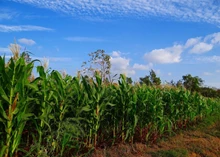
For the first time in 11 years, the Bangladesh government has raised the price of urea fertilizer, putting farmers at a disadvantage. The new Tk 6 per kilogramme increase went into effect yesterday, and farmers now have to pay Tk 22 per kg of fertilizer.
The last time the government raised the fertilizer price was in June 2011, when it was raised to Tk 20 per kg from Tk 12 per kg. The government reduced the price to Tk 16 per kg two years later. According to experts, the recent increase will increase the production cost of paddy by up to Tk 600 to Tk 700 per acre, ultimately raising food prices on top of already rising essentials prices.
They claim that, while the price increase is minor, it will have a negative impact on farmers by reducing profits and discouraging them from cultivating more rice. As part of its efforts to achieve food security, the government provides fertilizer subsidies.
According to M Asaduzzaman, former research director at Bangladesh Institute of Development Studies (BIDS), the government may have made the decision based on the International Monetary Fund's recommendation, which always discourages subsidies.
"The decision comes at a time when farmers are already concerned about reduced output due to less rainfall." Now, the price increase of urea fertilizer will raise production costs and, as a result, the burden on the people," he explained.
On July 24, the government requested a $4.5 billion loan from the IMF. Economist Binayak Sen believes the government should have reduced other subsidies rather than raising urea prices.
"Our research has shown that fertilizer subsidies benefit poor farmers and help them increase production," he said. According to agro economist Jahangir Alam, the global price of fertilizer has been declining. "The government should have waited a few months longer before raising the price," he said.
The agriculture minister stated in February that the import cost of urea would be Tk 96 per kg in fiscal 2021-22. That cost has now increased to Tk 81, according to a release from the agriculture ministry yesterday.
"Farmers may reduce the use of fertilizer to cut costs, which may reduce total rice production," Jahangir added. Farmers may also be discouraged from cultivating rice due to higher production costs, in which case "the government would then have to import rice at higher prices," according to Jahangir.
Following the price increase, dealers will have to pay Tk 20 instead of Tk 14 for each kg of urea, according to a press release from the agriculture ministry. The global market price of fertilizer is currently Tk 81 per kg. As a result, even after the price increase of Tk 6, the government will have to pay a subsidy of Tk 59 per kg, according to the release. In fiscal 2005-06, the fertilizer subsidy was only Tk 15 per kg.
According to agricultural ministry sources, the country has an adequate supply of all types of fertilizer. Fertilizer demand in the Aman season (July-September) is typically around 6,19,000 tonnes, with 7,27,000 tonnes currently on hand. According to a press release from the agriculture ministry, global fertilizer prices have increased three to fourfold, forcing the government to increase subsidies nearly fourfold. The fertilizer subsidy allocation was Tk 7,717 crore in fiscal 2020-21, rising to Tk 28,000 crore in fiscal 2021-22.
On July 23, Agriculture Minister Muhammad Abdur Razzaque stated that the government was at a loss as to how to manage subsidies in the face of rising fertilizer prices.
"We are well aware that a rise in fertilizer prices would have an economic repercussion." Farmers will suffer even more, production costs will rise, and food prices will rise as a result. "However, this massive subsidy will impede development work," he said in a press conference.
He also stated that government officials have been discussing how to manage the subsidy burden caused by a two-to-threefold increase in imported fertilizer prices. He also stated that the government provides subsidies for TSP, MOP, and DAP fertilizers. When asked if they plan to reduce subsidies for those as well, he said, "We are thinking about it." We are also keeping an eye on fertilizer prices on the international market."
According to the agriculture ministry, the current demand for fertilizer this fiscal year is 57.5 lakh tonnes, with urea accounting for the largest portion, 26 lakh tonnes, followed by DAP (16 lakh tonnes), TSP (seven lakh tonnes), and MOP (7.5 lakh tonnes). State-owned factories supply approximately 8.77 lakh tonnes of the total annual demand for urea, with the remainder imported. Due to the gas crisis, two state-owned urea manufacturing plants are currently closed.











